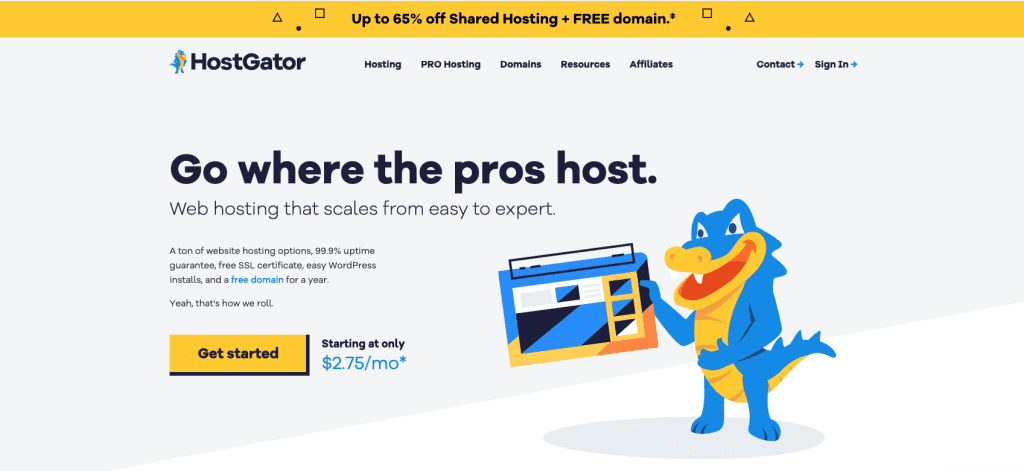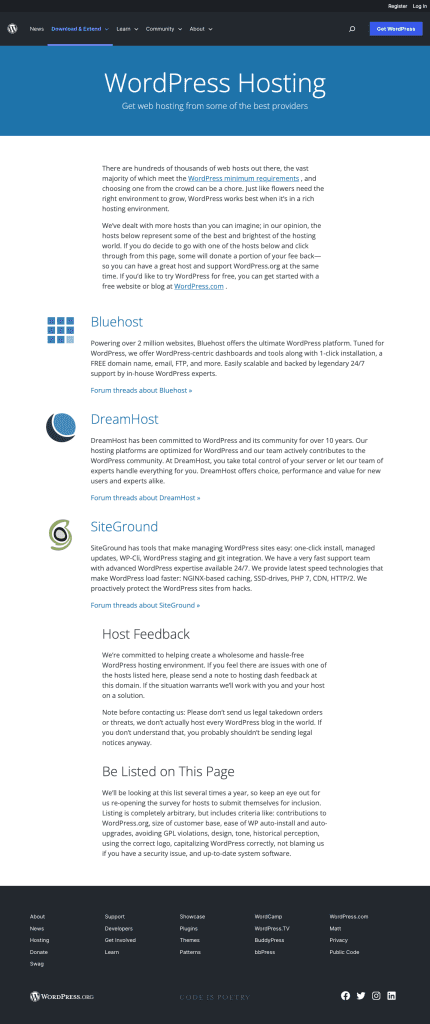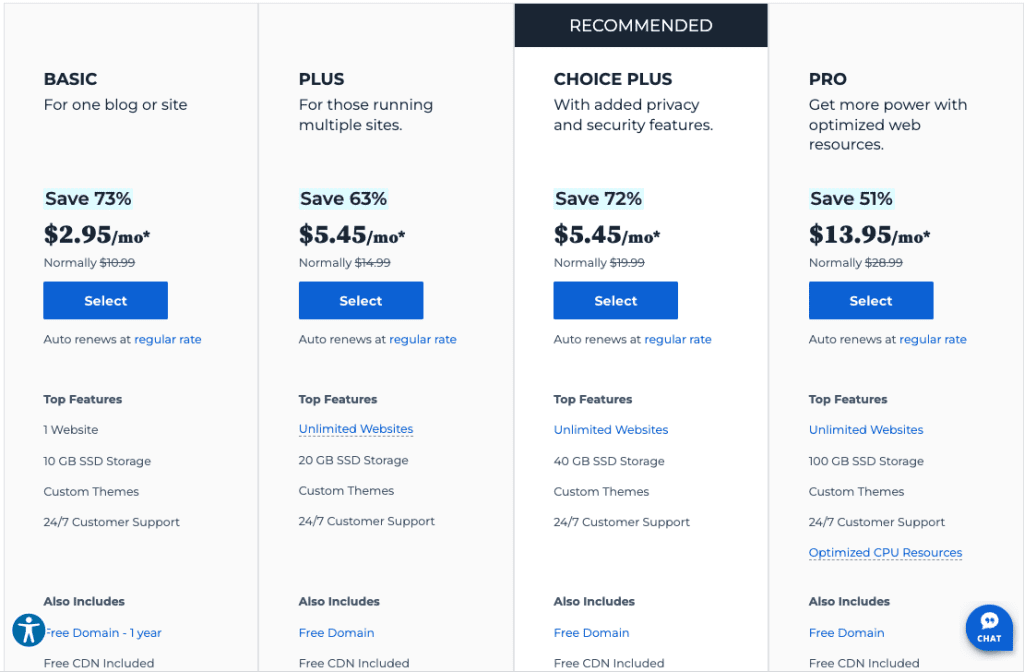If you want to build a website today, you need to host it somewhere. Whether you are hosting it on the web builder platform itself, or your own hosting server, a reliable hosting service is very important. There are lots of options out there that offer similar hosting services. This includes Bluehost, Hostgator, Godaddy and lots more.
Today, we will be comparing two of the big names, Bluehost and HostGator. Both of these web hosting providers had been doing well in assuring top-tier service in the saturated market.
Although both Bluehost and HostGator offer similar services, which one is truly the best web hosting service?
If you had been following me, you will notice I always talked about the hosting company that I use on a few of my websites. Which is Bluehost. You might feel that I am biased toward Bluehost as a user, but when we compare in detail, Bluehost is still the champion over HostGator for me.
While HostGator isn’t far behind, Bluehost’s appealing packages and offers hit the sweet spot of affordability and usability. Which is perfect for anyone to start with.
Read more on how to build a WordPress website from scratch.
Bluehost or HostGator: Which is Better?

Bluehost can be the perfect match for WordPress novices and experts. And for those who would want a highly affordable hosting plan to start with. You can start with less than $3 a month and only upgrade to larger when your sites grow. This can be done pretty simply with different hosting options available. Not only that, Bluehost has a clearly organized dashboard with excellent customer support.
Not to forget, it’s one of the three web hosting services recommended by WordPress itself. You can get the info from the WordPress.org page.

HostGator, on the other hand, is also an insanely powerful web hosting provider that gives you excellent uptime and an excellent customer support system. Its feature-rich hosting plans include free website migration and an integrated site builder, making it a good choice for all levels of users.
If you’re considering giving it a try, check it out here.
Best Web Hosting Services – Review
Of course, you don’t need to take my word for it. There are a lot of other credible hosting solutions out there for your website, you don’t have to restrict your options to Bluehost or HostGator. It’s just that for me, when I build a WordPress site, definitely I will go for the first recommended one by WordPress itself.
Pros of Bluehost
Recommended by WordPress:
Getting an official endorsement from WordPress is not easy. It means a lot to those looking for a WordPress hosting provider. Precisely, out of all the platforms out there, why would WordPress recommend something that is bad? It will ruin my reputation and brand. And see, if you head over to WordPress.org, the official website for WordPress, you will find that WordPress gives Bluehost the top spot on its list of the best WordPress web hosting providers.

Fast Hosting:
One of the key parameters that are measured in SEO is the loading speed. And in fact, when your website took too long to respond, chances are the person already navigated away. With an official endorsement by WordPress like that, one would expect the loading speed to be fast. Bluehost certainly doesn’t disappoint, with the 2 million websites hosted on it. If you want to make your business successful, you need fast site load speeds and server response time. Where Bluehost delivers excellent speed consistently.
Incredible Server Uptime:
Your website is like your storefront that works 24/7. Certainly, you don’t want any interruptions of service so that your audience is unable to view your site. Server Uptime refers to the portion of time that your site is online. The industry standard for hosting companies is around 99%, but Bluehost outdoes this, with its average coming up to 99.9%. And this is the minimum for their lower-level shared hosting plans. If you opt for its dedicated hosting of VPS hosting plans, you can expect it to touch near 100%.
Flexible and Scalable:
Your hosting grows with your business. You don’t get huge hosting and wait for your business to grow, this will waste your money upfront. Instead, scale your hosting server with your business growth. Bluehost offers different plans that are tailored to suit all kinds of users’ needs and give you enough flexibility to expand when required. This is proven by the user base of Bluehost which includes blogs till big websites will millions of visitors monthly.
Upgrading to a higher-tiered hosting plan or something else can be done seamlessly, without your site having to experience downtime during the change. Moreover, Bluehost has a custom interface that allows you to monitor and manage server resources to determine the right time to upgrade.

Excellent Customer Support:
You might not need this if you are an expert and don’t experience any issues. But it needs to come in handy. You won’t necessarily need Bluehost customer support daily, but when you do, just know it’s rock-solid and efficient. From my experience, it’s fast and good.
You can get solutions to your problems via live chat, phone support, or social media support. But, in some cases, you can have self-troubleshooting by referring to the extensive support library that contains hundreds of detailed walkthroughs and FAQs to fix common problems.
Top-Notch Security:
Cybersecurity is very important for anyone using the internet. A cyber attack can happen to you at any time. Bluehost provides secure shell access (SSH) to allow admin and web devs to securely access config files. They also use anti-spam tools like SpamExperts, Spam Hammer, and Apache SpamAssassin to keep bot attacks at bay.
Other security features include password-protected directories, IP addresses, email account and user account filters, and digital certificates, and private key management access. This is very important even if you are using another hosting service, make sure you check on this part. You don’t want to wake up facing denied of accessing your own websites.
App and Integration Library:
One of the biggest USPs of Bluehost is its massive application library. With the long-term support for WordPress, there are many optimizations done for WordPress sites. You can enable all kinds of services and software through this app to add more functionality to your site and hosting account.
You can add eCommerce functionality as well as plug your hosting account into Google apps, which, in turn, will give you direct access to an even more extensive plugin library to choose from.
Offers Freebies That Matter:
Many web hosting providers give their customers freebies. Sadly, most of them are shallow and don’t offer any value. With Bluehost, all of its hosting plans include a free domain name (for the first year), a free SSL certificate, free CDN, domain privacy and even daily backups and website restoration.
Cons of Bluehost
Expensive site migration fees or ASP.net/Windows Hosting:
Many hosting services offer free migrations if you want to move an existing site to its servers, but unfortunately, Bluehost doesn’t. If you don’t want to migrate your site over to Bluehost, you will have to pay a fee of $149.99 to migrate up to five websites and 20 email accounts.
Bluehost is a Linux-only hosting company, meaning there’s no support for websites that need a Windows server to run. As a majority of the market use Linux, this isn’t a deal-breaker. But if you are using Windows servers, you may want to look for other options.
Higher Renewal Prices:
The introductory prices of Bluehost make it one of the most affordable hosting providers for anyone to start. However, make sure you’re ready for a price jump when you renew your subscription. Bluehost usually offers a discounted price for a 3 years bundle but when you renew later, it will be the normal price.
This isn’t an issue unique to Bluehost. We call this business strategy to lure new customers in. The most hosting company does it anyway, but it’s important to point it out to help you make the right decision. And not getting a heart attack during renewal.
No Uptime Guarantee:
Downtime is detrimental to any website as it indicates the possibility of losing potential sales and conversions. It’s also why an uptime guarantee is important. Bluehost does offer excellent uptime, but as there’s no guarantee, you can’t expect compensation if you face downtime that’s below the specified percentage.
Considering most of the hosting providers’ rivals do give a guarantee to their users, one can only wish for Bluehost to follow suit.
Pros of HostGator
Excellent Uptime Guarantee:
HostGator consistently posts a 99.98-100% uptime, and this consistency isn’t without reason. HostGator does provide a commitment to comply with this. If they drop below 99.90%, users will receive one month of credit on their accounts. This is the guarantee HostGator commits. However, keep in mind that this is the standard as anything less isn’t generally tolerated.

Unlimited Everything:
HostGator offers unlimited everything—well, sort of. You can expect unlimited disk space that allows you to store as much data as you need and an unmetered bandwidth that allows you to move an unlimited amount of data between your host server, site visitors, and the internet.
What’s more, you also get unlimited databases, meaning you can have as many WordPress installs as you want. This can be particularly useful for those who have several clients and want to test website changes before making them live.
But keep in mind, as you are not getting a dedicated server, their unlimited is somehow limited. There are certain conditions like not using more than 25% of the server’s CPU, not sending more than 500 emails per hour, and so on, to keep things “unlimited.”

Best cPanel Hosting:
No web hosting provider offers a better version of cPanel than HostGator. You’ll find all sorts of tools and options to manage your site and domain from one place. The cPanel Control Panel particularly having many such tools. This includes file manager, FTP with user management, backup wizard, disk usage, domain manager, domain forward, DNS, database access through PHPMyAdmin, file compression, file upload, and file download.
One-Click Install and Free Site Transfer:
HostGator makes installing your preferred CMS under a few clicks. You can also use its QuickInstall tool to set up your website despite not having any technical skill/knowledge. In addition to this, you can transfer from another hosting company to them without any hassle. All you need to do is sign up for a plan you wish to use, and HostGator will take care of the rest.
Free SSL and Domain:
You can’t expect a premium quality SSL certificate from every hosting provider, and you certainly can’t expect it for free.
However, HostGator breaks this notion by providing Comodo SSL for all users and their hosted domains. So, you don’t have to worry about encryption between your website on the web browsers you use. You also get a free domain for one year—provided you sign up for hosting plans that offer this freebie.
Cons of HostGator
Limited Features:
While the unlimited bit sounds nice, one can’t help but notice that most features offered by HostGator are pretty standard. Also, shared hosting users can’t expect extras and will have to handle their websites’ administrative work manually. Most of the tasks need to be done manually.
Ensuring daily backups, and updating any core, plugins, themes, and security measures are entirely your responsibility.
Slow Customer Support:
HostGator offers 24/7 hosting customer service via live chat, phone, and email. And their support team is willing to help you and fix most of the issues you face, but it isn’t necessarily the best in the industry.
Many customers have complained about slow support responses, which can get particularly annoying when you get stuck while doing something important and need immediate help.
No Free Daily Backups:
Daily backup is certainly the most important thing to avoid your website from being corrupted or not accessible. You can always fall back on the last backup. Unfortunately, you won’t find any daily backup guarantee with HostGator as they only offer one backup a week.
Besides, you won’t be able to restore the site unless you pay for that. I recommend installing a plugin that does daily backing up for you. You can choose HostGator’s premium backup and restore tool called CodeGuard which costs a one-time of $24 per year.
Or you can select a WordPress tool to create a copy of the entire site and send it to Amazon, Google Drive, or Dropbox.
Comparing Both Platforms – Bluehost Vs HostGator
There’s no doubt that Bluehost and HostGator are two of the leading web hosting service provider that offers exceptional service. However, you can also look for other alternatives that match all the features you need.
You should consider Bluehost if you want an affordable hosting plan that offers excellent WordPress-specific support, along with some fantastic freebies. HostGator will make a better choice if you want higher uptime and an intuitive cPanel control panel.
Regardless of your choice, you can be sure to have a reliable web hosting provider that ensures your site stays functional all year long, helping you provide a better customer experience while maximizing conversions and revenue.
Read more on how to build a WordPress website from scratch.





